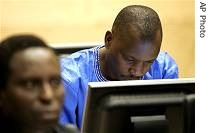Tran report - Download 410k
Former Congolese militia leader Thomas Lubanga is the first person to be tried by the world's only permanent global war crimes court, the Hague-based International Criminal Court. Phuong Tran reports from VOA's Central Africa bureau.
![]()
Listen to Tran report
![]()
The prosecution team will present alleged child victims as witnesses to testify that Thomas Lubanga forced children to fight for his ethnic militia, the Union of Congolese Patriots, in the Democratic Republic of Congo.

Thomas Lubanga (r) in the International Criminal Court in The Hague
Anneke Van Woudenberg, with the U.S.-based Human Rights Watch lobby group, says the alleged victims' presence in the courtroom makes this case a landmark in international justice.
"It is quite unique for any international court to have a very official role for victims to be able to participate," she noted.
Prosecutors say Lubanga was responsible for allowing children as young as 10 to be kidnapped and forced to fight when he headed a militia in the mineral-rich northeast of the Democratic Republic of Congo.
Human rights activists say inter-ethnic clashes in Ituri and violence between militia groups vying for control of the mines left 60,000 people dead.
Lubanga's lawyer, Jean Flamme, says the fact that the court is not charging Lubanga for any of these killings discredits the child recruitment charge. "Why are the killings not in the charges?" asked Flamme. "There are tens of thousands dead over there. No one is charged with killings. Enrolling child soldiers and using them in hostilities - to do what? There is no answer to that question."
Human Rights Watch's Van Woudenberg says Lubanga is guilty of much more than forced child recruitment. "His group has committed numerous other atrocities in [Democratic Republic of] Congo including murder, rape, massacres," she said. "But those are not charges that he currently faces at the court. For justice to be done, it is important he is charged for the broad range of crimes."
Even if the prosecution charges Lubanga with additional crimes, Flamme says his client cannot be held responsible for members of his militia. Flamme says during the six months Lubanga headed the army, he faced several mutinies.
Flamme says his client was a victim of international and Ugandan mining interests who retaliated when he refused to grant them rights to the mines. "He was not able to contain the army he inherited," said Flamme. "Lubanga did not incite his army, inherited by hazard, to kill. On the contrary, he instructed them to protect the population and stop the killings. "
Van Woudenberg and the prosecution team disagree with those who say Lubanga was a frustrated pacifist politician battling corruption. They say he is a warlord who promised children weapons and wealth if they fought for him.
If convicted, Lubanga faces a life sentence.
The prosecution is investigating another Ituri group and says it will soon issue more war crimes arrest warrants.
The mineral-rich DRC has been a battleground for local rebels, militia groups and armies from neighboring countries. There are still pockets of instability, even after the country's first open elections in more than four decades, overseen by one of the United Nations' largest peacekeeping forces.
Related articles
- • UN Security Council Calls on Rwanda to Stop Supporting M23 Rebels in DR Congo (February 22, 2025)
- • 'Deadly environment' plus 'political and social' obstacles hinder Ebola fight, Security Council hears (July 24, 2019)
- • Ebola outbreak declared an international Public Health Emergency (July 17, 2019)
- • DR Congo Delays Results of December Election (January 6, 2019)
- • At least 30 dead after massacres in Ituri (March 2, 2018)
- • ICC Confirms 14-Year Sentence Against Thomas Lubanga (December 1, 2014)
- • ICC sentences Germain Katanga to 12 years (May 23, 2014)
- • ICC finds Germain Katanga guilty of war crimes and crime against humanity (March 7, 2014)
- • Bosco Ntaganda Attacked Civilians on Ethnic Grounds, ICC Prosecutor Says (February 10, 2014)
- • Rwanda 'recruiting for M23 rebels' (July 31, 2013)
- • Rebel Leader Bosco Ntaganda Makes First Appearence Before the ICC (March 26, 2013)
- • Bosco Ntaganda in the International Criminal Court's custody (March 22, 2013)
- • International Criminal Court Acquits Mathieu Ngudjolo Chui (December 18, 2012)
- • DR Congo Will Not Negotiate With M23 Rebels, Government Says (November 19, 2012)
- • M23 Rebels Committing War Crimes (September 11, 2012)
- • Kagame Is A Problem for The U.S. and The U.K. (June 23, 2012)
- • US blocking UN report on Ntaganda rebels, Human Rights Watch says (June 21, 2012)
- • ICC Prosecutor Seeks 30 Years for Thomas Lubanga (June 13, 2012)
- • Congo Government Says Bosco Ntaganda Rebels Trained in Rwanda (June 10, 2012)
- • Rwanda Should Stop Aiding War Crimes Suspect Bosco Ntaganda: Human Rights Watch (June 4, 2012)
- • ICC Prosecutor Seeks New Charges Against Ntaganda, FDLR Leader (May 14, 2012)
- • Kabila's Position on The Arrest of Ntaganda 'Has Not Changed' (April 13, 2012)
- • DR Congo Government Warns Bosco Ntaganda He May Face Justice (April 6, 2012)
- • Thomas Lubanga found guilty of using child soldiers (March 14, 2012)
- • Case of UN Employee Caught Smuggling Minerals Not Unique (August 25, 2011)
- • Rights Groups: Strengthen Civilian Protection Before Elections (June 9, 2011)
- • Germany: Groundbreaking Trial for Congo War Crimes (May 2, 2011)
- • Militiamen Sent to Testify in Warlords Trials at ICC (March 28, 2011)
- • Thomas Lubanga trial to resume at ICC (October 8, 2010)
- • UN DR Congo Report Exposes Grave Crimes (October 1, 2010)







